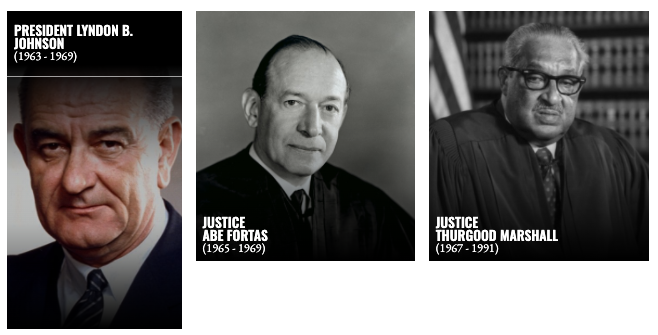The Volokh Conspiracy
Mostly law professors | Sometimes contrarian | Often libertarian | Always independent
Today in Supreme Court History: August 26, 1964
8/26/1964: Lyndon B. Johnson nominated as Democratic candidate for president. He would make two appointments to the Supreme Court: Justices Abe Fortas and Thurgood Marshall.

Editor's Note: We invite comments and request that they be civil and on-topic. We do not moderate or assume any responsibility for comments, which are owned by the readers who post them. Comments do not represent the views of Reason.com or Reason Foundation. We reserve the right to delete any comment for any reason at any time. Comments may only be edited within 5 minutes of posting. Report abuses.
Please to post comments


Beltran v. Smith, 458 U.S. 1303 (decided August 26, 1982): imprisoned gangster, cooperating with prosecutors and in the Witness Protection Program, claims that he will be killed if transferred to another prison; Rehnquist denies stay of transfer order, no showing that program officials will fail to protect him (he served his time and afterward got back into gang activity, in 2009 was killed in a shootout with police)
So he did need protection after all.
ha!
How many kids did LBJ kill that day? But hey, he was better than that Goldwater nut, who would have put half a million troops in Vietnam.
Communism is the road to poverty. It should be promoted in our enemies and crushed at home. China goes 10% capitalist. Now they are buying us out.
England gets the steam engine, now you have the British Empire.
I suggest crushing the worthless and toxic lawyer profession. Take its $trillion now poisoning us. Put it into research and development.
Eugene was a prodigy. Look at the meaningless trivia stuff he is totally wasting his life on. It is as toxic to the lawyer asto the public.
The British had an empire long before the steam engine.
So did the Dutch, Belgium, and Portugal. What happened to them?
They're still there.
President Johnson recorded all his White House phone calls (which is where President Nixon got the idea.) Presidential historian compiled some of them in two fascinating volumes: Taking Charge: The Johnson White House Tapes, 1963–1964 (1997) and Reaching for Glory: Lyndon Johnson's Secret White House Tapes, 1964–1965 (2001) (both available to borrow at archive.org. (A third volume has been forever "forthcoming", but has not appeared yet).
Johnson seems to have decided from the beginnings of his presidency exactly who his first two appointees (if the opportunity arose) would be: first, his crony Abe Fortas, and, second, Thurgood Marshall.
A phone call with Attorney General Nicholas Katzenbach on May 14, 1965, shows Johnson's impatience with not yet having had a vacancy on the Court to fill. It also seems to show that Johnson barely had an idea who was on the Court, much less the judicial philosophy of its members. Johnson asks Katzenbach when he thinks a spot will open up on the Court. Katzenbach replies that he thinks Justice Harlan would retire at the end of the term. (Harlan would, in fact, stay on the Court until 1971). Johnson then asks for an ideological breakdown of the Court. Katzenbach replies that he would "crudely" divide it into five liberals (Warren, Black, Douglas, Brennan, and Goldberg) and four conservatives (Stewart, Clark, White, and Harlan). Johnson concluded the call by asking Harlan's party affiliation; Katzenbach replied he was a Republican.
Tired of just waiting for vacancies to naturally arise on the Court, Johnson decided to engineer some. He convinced Justice Goldberg, who had been appointed by Kennedy, to step down and become UN Ambassador. Exactly how he accomplished this has been a matter of much speculation. Some have even suggested Johnson offered Goldberg the VP slot for his 1968 re-election campaign, though, ultimately Johnson did not run for re-election. My opinion is that Johnson appealed to Goldberg's vanity, selling him on the idea that the UN Ambassadorship would allow him to be instrumental in ending the Vietnam War, which had become the preeminent issue for the Democratic Left. Goldberg likely overestimated the power of the position as well as his own abilities to affect any fundamental change on the issue.
Johnson then essentially forced Justice Tom Clark to retire when he appointed his son Ramsey Clark as Attorney General, as otherwise the elder Clark would forever be recusing himself from cases. So, with a bit of maneuvering, Johnson got his two vacancies and his two chosen appointees.